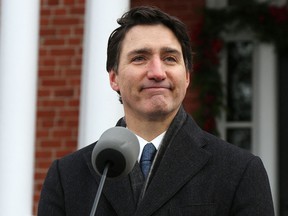A New Era of Leadership for the Liberal Party
After months of speculation, Justin Trudeau has finally announced that he will step down as Prime Minister once a new leader is selected within the Liberal Party. This development marks the end of an era and sets the stage for a fresh chapter in Canadian politics.
Economic Implications: A New Wave of Uncertainty
The resignation of Trudeau has sent shockwaves throughout the Canadian economy, with many economists predicting a wave of uncertainty that will impact financial markets. Tu Nguyen, an economist at RSM Canada, notes that "Trudeau’s resignation ushers in a new wave of uncertainty for the Canadian economy and financial markets."
Investor Confidence Takes a Hit
The sudden change in leadership has caused a surge in uncertainty, with Bloomberg’s Canada Economic Policy Uncertainty Index reaching its highest level ever. This increase in uncertainty highlights the risks to the economic outlook caused by the political sector. Nguyen worries that the instability will discourage foreign investment, which has been attracted to Canada due to its stable environment.
A Rebound Year in Jeopardy?
Nguyen predicts that this latest bout of political instability could delay recovery as businesses may adopt a wait-and-see approach instead of investing and hiring. This could jeopardize the expected rebound year, which was supposed to see inflation ease and Bank of Canada interest rate cuts boost the economy.
Power Vacuum Creates Uncertainty
Stephen Brown, assistant chief North America economist at Capital Economics Ltd., describes the situation as a "power vacuum" that creates uncertainty at a bad time. With Donald Trump’s repeated threat of 25% tariffs on Canadian goods, the timing could not be worse. However, Brown believes that a new Conservative government led by Pierre Poilievre would stand a better chance of working with the new US administration.
Conservative Policies: A Fresh Approach
Among the policies that Brown thinks would resonate with Republicans are a balanced budget rule, reduction in capital gains taxes, and significant reductions to regulations hindering business investment. He notes that at a time when Canada’s productivity performance has been abysmal, there is some sympathy for the idea that overburdensome regulation is holding back the economy.
Federal Policy ‘Sea Change’ on the Horizon
Tony Stillo, chief economist at Oxford Economics, believes that Trudeau’s resignation accelerates an expected "sea change" in federal policy. With a spring election more likely, the New Democratic Party and Bloc Québécois will press the Liberals to include their priorities in the next federal budget. If the Conservatives secure a majority, they would have the ability to reduce government size, restore fiscal balance, cut taxes, axe the carbon tax, and reduce immigration.
Conclusion: Uncertainty Reigns Supreme
The resignation of Justin Trudeau marks the beginning of a new era in Canadian politics, but it also brings uncertainty that will impact the economy. As the country navigates this uncharted territory, one thing is clear – the future is uncertain, and only time will tell what lies ahead.
Recommended Reading:
- Justin Trudeau to resign after Liberals choose new leader
- Jack Mintz: A sinking dollar is Trudeau’s latest legacy
Join the Conversation:
Stay up-to-date on the latest news and analysis by following us on social media. Share your thoughts on what the future holds for Canada under new leadership.
